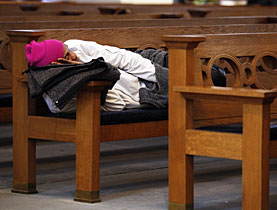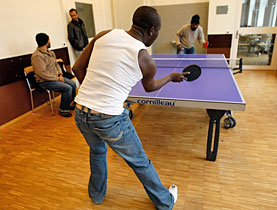“Invisible workers” fight for recognition

After the recent 19-day protest by illegal immigrants in Zurich highlighting grievances, many so-called sans-papiers are still dealing with daily challenges.
Low wages, having to share beds and an inability to report domestic violence are just a few of the complaints made by people without legal documents in Geneva and Lausanne.
A young man with a heavy rucksack rests at the corner of the Rue de Bourg, one of Lausanne’s most expensive shopping streets. Three policemen immediately approach him and ask for ID.
“Where are you from? What’s your reason for being in Switzerland? What financial means do you have? How long do you intend to stay in Switzerland?” they ask.
Satisfied with his answers, they leave – but not without giving him a serious warning about the limited amount of time he can stay in the country.
The young man is A.C.*, a 29-year-old trained musician from Argentina who has been working temporarily in Switzerland picking grapes. Without a fixed residence, he stays with people he has met on his travels and sometimes sleeps rough.
“It’s the only way of saving any money in this incredibly expensive country,” he told swissinfo.
It’s pretty much impossible for him to obtain legal residence unless he marries a Swiss.
“If the only way of staying is to get a girl pregnant – then forget it,” he said. “I’m not that desperate.”
“Paternalist”
A.C. received SFr600 ($515) for eight days grape-picking. Meanwhile, a domestic worker can earn SFr3,000 a month, although salaries of SFr1,200 for 60 hours a week are not uncommon.
“Once I’ve paid my bills, rent and other monthly expenses, I have about SFr300 left for the rest of the month,” said H.C., a 44-year-old Colombian who works as a cleaner.
“I pay for my daughter’s studies in Colombia, but I haven’t seen her for the past 11 years as I can’t leave Switzerland.”
The impossibility of moving around freely is a common complaint among those people interviewed.
An estimated 300,000 people reside illegally in Switzerland, a tenth of whom are in canton Zurich.
According to non-governmental organisation (NGO) statistics, 50-60 per cent of illegal immigrants spend 18-21 years without leaving the country. In extreme cases immigrants complain of being unable to attend the funerals of their relatives.
But H.C. criticises the “paternalist” attitude of NGOs and unions who defend asylum seekers’ rights.
“They don’t allow us to shoulder our own problems and act like responsible people,” he said.
“School-trained serfs”
“It’s been shown that after ten years in a country, people don’t travel anymore,” said Y.G., a sociologist from the Dominican Republic.
This means that in 20 to 30 years Switzerland will find itself “with a parallel society of hundreds of thousands of people who have no guarantees of their basic rights, like a pension or medical healthcare. The consequences of what is happening now will start to emerge then”.
Many Latin Americans travel on to Spain owing to “the ease with which they can get official papers there”, but once they are legal, they usually return to Switzerland because of “the abysmal difference in salaries”, according to Y.G..
The children of these “invisible” workers are guaranteed a basic education up to the age of 17, but after that the doors of Swiss universities and professional training institutions remain shut.
Switzerland is preparing a future generation of “school-trained serfs”, according to H.C.
Shared beds
Housing is one of the major headaches for sans-papiers, for whom rents are often 50-70 per cent higher than the going market rate. This leads to a phenomenon already known in some large Spanish cities as “hot beds”.
“There are houses shared by 15 to 20 people,” said L.R., a 36-year-old Ecuadorian woman who works as a cleaner.
“People sleep in these houses sharing the same bed. One person sleeps for eight hours, then the next sleeps eight hours in the same bed, and so on. The worst thing is that we often end up exploiting each other,” she said.
Given the impossible task of having a normal life here in Switzerland, why don’t people consider returning to their country of origin?
“I’ve given my youth and my life to this country. One day I want my existence and rights to be recognised,” said H.C..
Marriage
A particularly complex issue is the question of mixed marriages between Swiss and foreigners.
In the event of divorce, the Swiss keeps all their rights. There have been cases where the foreign parent has been deported and is only allowed to see their children once a year – if they can afford the trip.
Even more serious is the situation of foreign women who suffer abuse and domestic violence. In the event of divorce or legal separation (in the first five years of marriage), they lose their rights to residency and may be expelled. This leads to a “wall of silence” over numerous cases of assault or rape within marriage.
S. M., a 28-year-old Bolivian woman, earns SFr2,000 a month looking after young children ten hours a day from Monday to Saturday.
“The Swiss labour market has legalised the blatant discrimination between Europeans and non-Europeans,” she said. “How can we become integrated if we are people who are trying to hide our tracks and we cannot even put a name plaque on our front
door?”
* The people interviewed for this story asked for anonymity.
swissinfo, Rodrigo Carrizo Couto in Geneva and Lausanne
The number of asylum seekers in Switzerland peaked at 48,000 applications in 1999, with the majority coming from Serbia and Kosovo.
In 2004, the government stopped welfare benefits to rejected asylum seekers and the number dropped to 14,250.
In 2006, 10,500 people sought asylum in Switzerland. Almost 20% were accepted. The Swiss voted in a referendum in the same year to tighten asylum legislation, turning down applicants that did not have a passport and doubling the length of detention for rejected asylum seekers to two years.
The government recommended the measures after releasing a report that estimated there were 300,000 illegal immigrants living in Switzerland, 9,000 of whom had jobs. Others were suspected of carrying out criminal activities.
The new laws were criticised by the United Nations. The Swiss Federal Administrative Court in 2007 overruled the clause that allowed the authorities to expel asylum seekers without identification within 48 hours.
In 2008 the number of asylum seekers in Switzerland rose to 16,606 applications, compared with 10,390 asylum applications in 2007. According to the Federal Migration Office, Switzerland does not have enough accommodation to meet the rise and cantons have to make emergency arrangements.
Rejected asylum seekers who do not leave Switzerland are known as sans-papiers (people without documents) and are not allowed to work. They rely on cantons for subsidies and to support applications for special “hardship” visas that allow them to find employment after five years.
Around 150 rejected asylum seekers occupied a church in December claiming that Zurich was more draconian than other cantons. A compromise was reached and a special commission is to hear the case of perceived injustices against illegal immigrants in canton Zurich.

In compliance with the JTI standards
More: SWI swissinfo.ch certified by the Journalism Trust Initiative











You can find an overview of ongoing debates with our journalists here . Please join us!
If you want to start a conversation about a topic raised in this article or want to report factual errors, email us at english@swissinfo.ch.